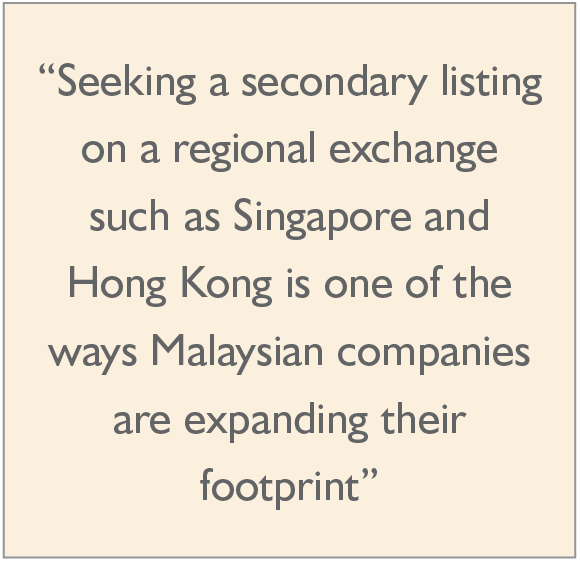 By Karen Lyn Johnson, AZMI & Associates
By Karen Lyn Johnson, AZMI & Associates
Dual listing is when a company’s shares are listed on two or more different exchanges in addition to its domestic exchange for the purpose of adding liquidity to the shares and allowing investors greater choice in where they can trade their shares.
In Malaysia, a dual or secondary listing on another exchange such as Singapore is an option for listed companies that desire a better valuation, higher trading liquidity or more interest from foreign funds for their securities. Companies such as Malaysia Smelting Corp and IHH Healthcare have successfully had their stocks listed in Malaysia and Singapore. A dual listing is also sometimes known as a cross listing.
Why do companies seek multiple listings?
There are many potential benefits to having a listing on more than one stock exchange, among which are the following:
1. Increased access to capital
As capital markets are increasingly globalised, an issuer may gain increased access to capital outside the home market. A new listing may open up an investor base that is bigger and perhaps has greater familiarity with the issuer’s business sector than in its home market.
2. Greater market liquidity
Being listed in dual/multiple exchanges will also allow the listed issuer to increase its total trading volume (combined home and new market) and decrease the cost of capital as their shares become more accessible to global investors.
3. Information disclosure
By obtaining a listing on an exchange whose rules on disclosure are stringent, a company can benefit from the stringent disclosure made previously to signal their quality to outside investors and to provide improved information to potential customers and suppliers.
4. Greater market visibility
Foreign listing can increase recognition and visibility of the issuer and its products/services with customers, partly through additional media coverage and financial research and analysis. This could, in some circumstances, result in increased commercial benefits in the form of export sales as well as to facilitate foreign acquisitions.

Malaysian regulation on cross listings of Malaysian-incorporated listed companies on the foreign stock exchange
In 2006, the Malaysian Securities Commission (SC) introduced new measures to facilitate the listing in Malaysia of foreign-owned corporations having operations abroad as well as secondary listings on foreign stock exchanges of main board-listed Malaysian companies. In addition, the new measures also allow healthy Malaysian companies listed on the main board of Bursa Malaysia to seek secondary listings on foreign stock exchanges that are members of the World Federation of Exchanges with a view to attaining international recognition. The new measures had subsequently been encapsulated in Part C of Chapter 5, Equity Guidelines issued by the Securities Commission in 2009.
Pursuant to Part C of Chapter 5 of the Equity Guidelines, in approving any proposal from a Malaysian-incorporated listed company to seek cross listing on a foreign stock market, the SC will have to be satisfied that the listing will benefit the company.
Furthermore, the foreign stock market where the cross listing is sought must be a member of the World Federation of Exchanges and must be based in a jurisdiction that is subject to corporation laws and other laws and regulations that have standards at least equivalent to those in Malaysia, particularly with respect to:
(a) corporate governance;
(b) shareholders and minority interest protection;
(c) disclosure standards; and
(d) regulation of takeovers and mergers.
Disadvantages of dual or cross listing
Besides the obvious increase in listing costs, there are other disadvantages to dual or multiple listing, such as increased reporting and disclosure requirements as well as additional scrutiny by analysts and institutional investors in advanced economies and closer scrutiny by the public in the markets that the company is listed.
Conclusion
In recent times, Malaysian companies are increasingly going regional. Seeking a secondary listing on a regional exchange such as Singapore and Hong Kong is one of the ways of expanding their footprint.
With the increased globalisation of markets around the world, Bursa Malaysia and the SC has been constantly working to improve the governance foundations of our financial market and more relaxed rules by SC. In light of this, we should see more companies joining the bandwagon to undertake dual or cross listings in the future.

T: 603 2118 5000 Ext 5028














 Azmi & Associates
Azmi & Associates Dato’ Azmi Mohd Ali
Dato’ Azmi Mohd Ali Norhisham Abd Bahrin
Norhisham Abd Bahrin Syed Zomael Hussain
Syed Zomael Hussain







